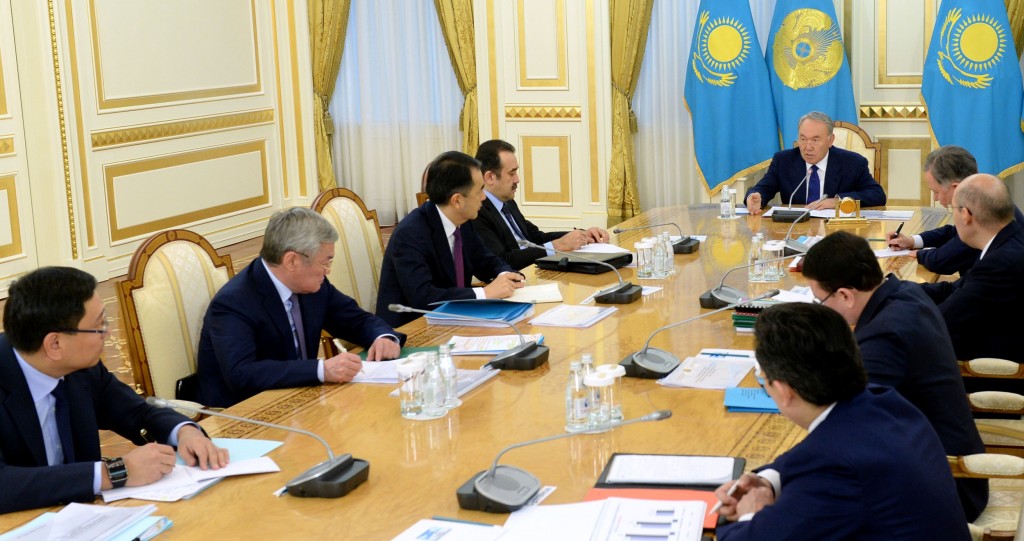ASTANA – Kazakh President Nursultan Nazarbayev assessed the state of the national economy and financial sector during a Jan. 15 meeting at the Akorda on the nation’s social and economic development. The meeting focused on measures to ease the burden of the expected economic woes on citizens, given the regional economic uncertainty and the expected slowdown of economic growth.
 “The consequences of the 2007-09 global financial and economic crisis included the fall in prices for export commodities of the country, especially oil, which costs decreased below $50 a barrel in half a year. Prices for the products of nonferrous and ferrous metallurgy, which also provide the flow of funds to the state budget, decreased. In addition, the situation in Ukraine and related sanctions against Russia and the current state of the Russian ruble affect our state. In this respect, we should monitor the situation and take appropriate action,” said the President at the meeting.
“The consequences of the 2007-09 global financial and economic crisis included the fall in prices for export commodities of the country, especially oil, which costs decreased below $50 a barrel in half a year. Prices for the products of nonferrous and ferrous metallurgy, which also provide the flow of funds to the state budget, decreased. In addition, the situation in Ukraine and related sanctions against Russia and the current state of the Russian ruble affect our state. In this respect, we should monitor the situation and take appropriate action,” said the President at the meeting.
He noted that at the end of 2014, the government was asked to develop various scenarios for different economic conditions, the main task being to prevent the economic slowdown and preserve basic social benefits.
“Due to severe budget cuts, the government will have to revise some of its parameters. We have already made changes to the budget and if necessary, we should do it again. We should clearly explain to the population that we have begun saving money. During the years of independence, we have built more than 700 schools and the same amount of hospitals. Currently, we need to finish ongoing construction, while freezing construction of new facilities, including some investment construction projects. This work will continue after the end of the crisis,” the President added.
Concluding his speech, Nazarbayev positively assessed the 2014 economic growth of 4.3 percent, taking into consideration external challenge influences such as low oil prices and geopolitical tensions. He added that the main results of 2014 would be summarised at the enlarged government session to take place shortly.
Minister of National Economy Yerbolat Dossayev stressed that during the review of the three main possible scenarios, various options for the cost of a barrel of oil were taken into consideration.
“Today, we have all the necessary tools to implement the objectives set forth by the presidential state-of-the-nation address. The Nurly Zhol [economic programme] will be the main ‘pillar’ to conduct the counter-cyclical economic policy of the government in 2015. In addition, we prepared a package of practical measures including a plan to support industrial enterprises in 2015 and measures to develop public-private partnership and create new permanent and temporary jobs,” Dossayev said.
Referring to the preparatory work aimed at easing the consequences of the crisis on ordinary citizens, Nazarbayev stated that 75 objects would be implemented in the framework of the State Programme of Accelerated Industrial and Innovative Development, creating 7,500 new jobs. He added that the Nurly Zhol programme would also have a multiplier effect on the state’s economy.
In light of money-saving and new anti-corruption policies, the President emphasised that cases of inefficient spending should be excluded. For instance, targeted social assistance and benefits to large and needy families should not apply to wealthy people.
“The state is not a cash cow,” he declared.
Finance Minister Bakhyt Sultanov stated that in 2014 “the state budget parameters were fulfilled. Funds allocated under the Nurly Zhol programme and one trillion tenge (US$5.4 billion) from the National Fund will reach its goals.”
Reporting on the results of 2014 and the main directions of macroeconomic policy for in 2015, Chairman of the National Bank Kairat Kelimbetov stated, “In 2014 a substantial margin of safety for Kazakhstan’s economy was created. Gold and foreign exchange reserves reached $102 billion, while the National Fund reserves increased to $73 billion. Along with the implementation of the Nurly Zhol programme it allows [us] to confidently shape the economic policy for 2015. The National Bank intends to prevent sharp fluctuations in the exchange rate in the current year.”

